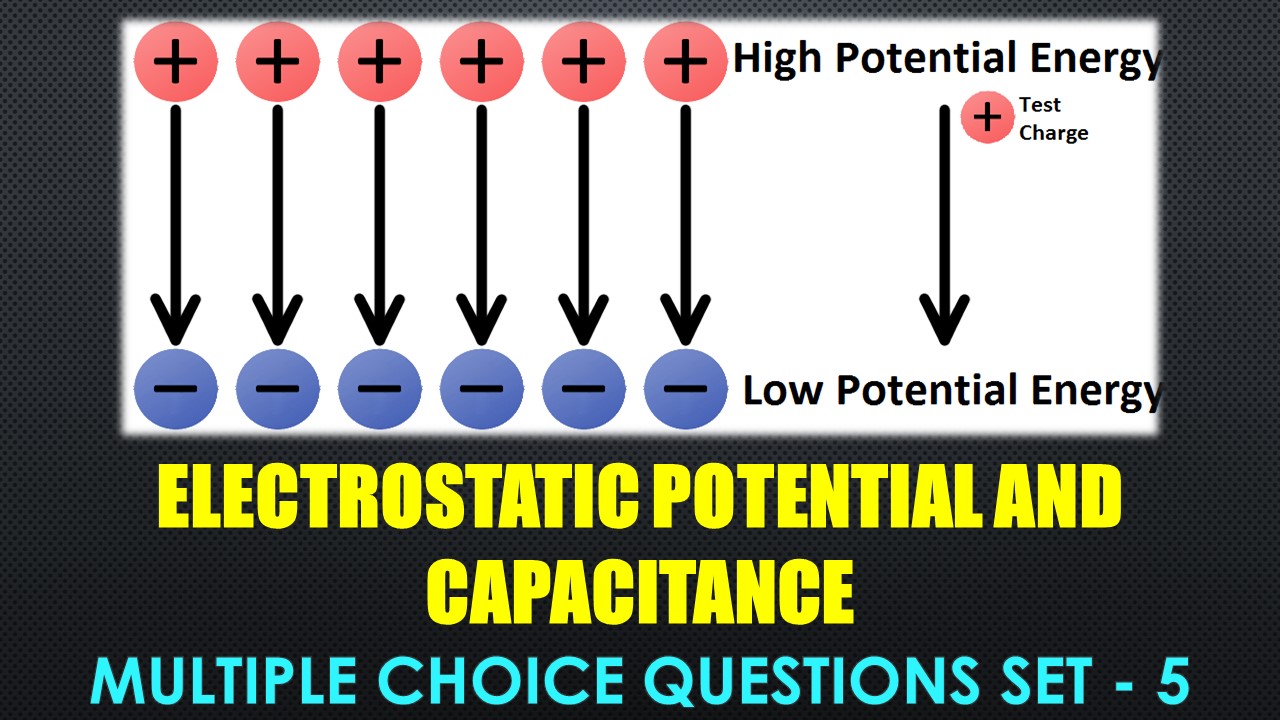CBSE Class 12 Electrostatic Potential and Capacitance Multiple Choice Questions with Answers. MCQ Questions Class 12 Electrostatic Potential and Capacitance with Answers Is Prepared Based on Latest Exam Pattern. Students can solve NCERT Class 12 Electrostatic Potential and Capacitance MCQs with Answers to know their preparation level.
Students who are searching for NCERT MCQ Questions for Class 12 Electrostatic Potential and Capacitance with Answers are compiled here to get good practice on all fundamentals. Know your preparation level on MCQ Questions for Class 12 Electrostatic Potential and Capacitance with Answers. You can also verify your answers from our provided MCQ Class 12 Electrostatic Potential and Capacitance with Answers. So, ace up your preparation with MCQ of Class 12 Physics Examinations.
MCQ Questions Class 12 Electrostatic Potential and Capacitance with Answers - Set - 5
Question 1:
n identical capacitors joined in parallel are charged to a common potential V. The battery is disconnected. Now, the capacitors are separated and joined in series. For the new combination:
(a) energy and potential difference both will remain unchanged
(b) energy will remain same, potential difference will become nV
(c) energy and potential both will become n times
(d) energy will become n times, potential difference will remain V.
Correct Answer – (B)
Question 2 :
Electric potential of earth is taken to be zero, because earth is a good
(a) insulator
(b) conductor
(c) semi-conductor
(d) dielectric
Correct Answer – (B)
Question 3 :
On moving a charge of 20 C by 2 cm, 2 J of work is done. Then the potential difference between the points is
(a) 0.1 V
(b) 8 V
(c) 2 V
(d) 0.5 V
Correct Answer – (A)
Question 4 :
A bullet of mass 2 g is having a charge of 2 μC. Through what potential difference must it be accelerated, starting from rest, to acquire a speed of 10 m/s ?
(a) 5 kV
(b) 50 kV
(c) 5 V
(d) 50 V
Correct Answer – (B)
Question 5 :
A uniform electric field of 10 NC-1 exists in the vertically downward direction. What is the increase in the electric potential asonegoes up through a height of 300 cm ?
(a) 15 V
(b) 30 V
(c) 45V
(d) None of these
Correct Answer – (B)
MCQ Questions Class 12 Electrostatic Potential and Capacitance with Answers
Question 6 :
A positively charged particle is released from rest in an uniform electric field. The electric potential energy of the charge
(a) remains a constant because the electric field is uniform.
(b) increases because the charge moves along the electric field.
(c) decreases because the charge moves along the electric field.
(d) decreases because the charge moves opposite to the electric field.
Correct Answer – (C)
Question 7 :
In brining an electron towards another electron, the electrostatic potential energy of the system
(a) increases
(b) decreases
(c) remains unchanged
(d) becomes zero
Correct Answer – (A)
Question 8 :
Two identical metal plates, separated by a distance d form a parallel-plate capacitor. A metal sheet of thickness d/2 is inserted between the plates. The ratio of the capacitance after the insertion of the sheet to that before insertion is
(a) 2 :1
(b) 2 : 1
(c) 1 : 1
(d) 1 : 2
Correct Answer – (B)
Question 9 :
The electric potential of earth is taken as:
(a) zero
(b) infinity
(c) unity
(d) None of these
Correct Answer – (A)
Question 10 :
What is the number of electrons in 100 g water?
(a) 3.35 × 1024
(b) 3.35 × 1025
(c) 6.02 × 1023
(d) None of these
Correct Answer – (A)
- NCERT Solutions Class 11 Chemistry Chapter 1 : Some Basic Concepts of Chemistry
- NCERT Solutions Class 11 Chemistry Chapter 2 : Structure Of The Atom
- NCERT Solutions Class 11 Chemistry Chapter 3 : Classification of Elements and Periodicity in Properties
- NCERT Solutions Class 11 Chemistry Chapter 4 : Chemical Bonding and Molecular Structure
- NCERT Solutions Class 11 Chemistry Chapter 5 : States of Matter
- NCERT Solutions Class 11 Chemistry Chapter 6 : Thermodynamics
- NCERT Solutions Class 11 Chemistry Chapter 7 : Equilibrium
- NCERT Solutions Class 11 Chemistry Chapter 8 : Redox Reactions
- NCERT Solutions Class 11 Chemistry Chapter 9 : Hydrogen
- NCERT Solutions Class 11 Chemistry Chapter 10 : The s-Block Elements
- NCERT Solutions Class 11 Chemistry Chapter 11 : The p-Block Elements
- NCERT Solutions Class 11 Chemistry Chapter 12 : Organic Chemistry: Some Basic Principles and Techniques
- NCERT Solutions Class 11 Chemistry Chapter 13 : Hydrocarbons
- NCERT Solutions Class 11 Chemistry Chapter 14 : Environmental Chemistry



